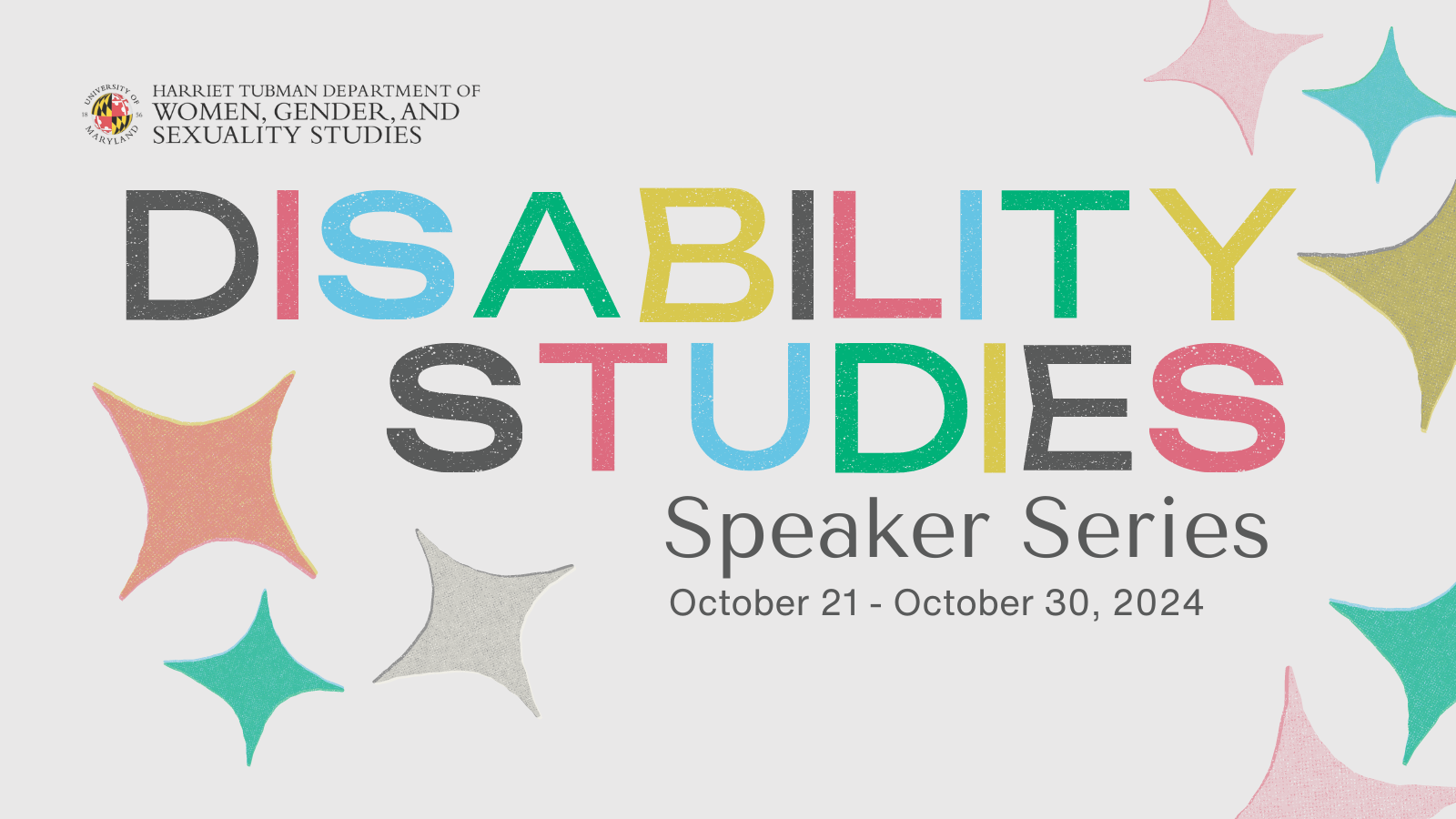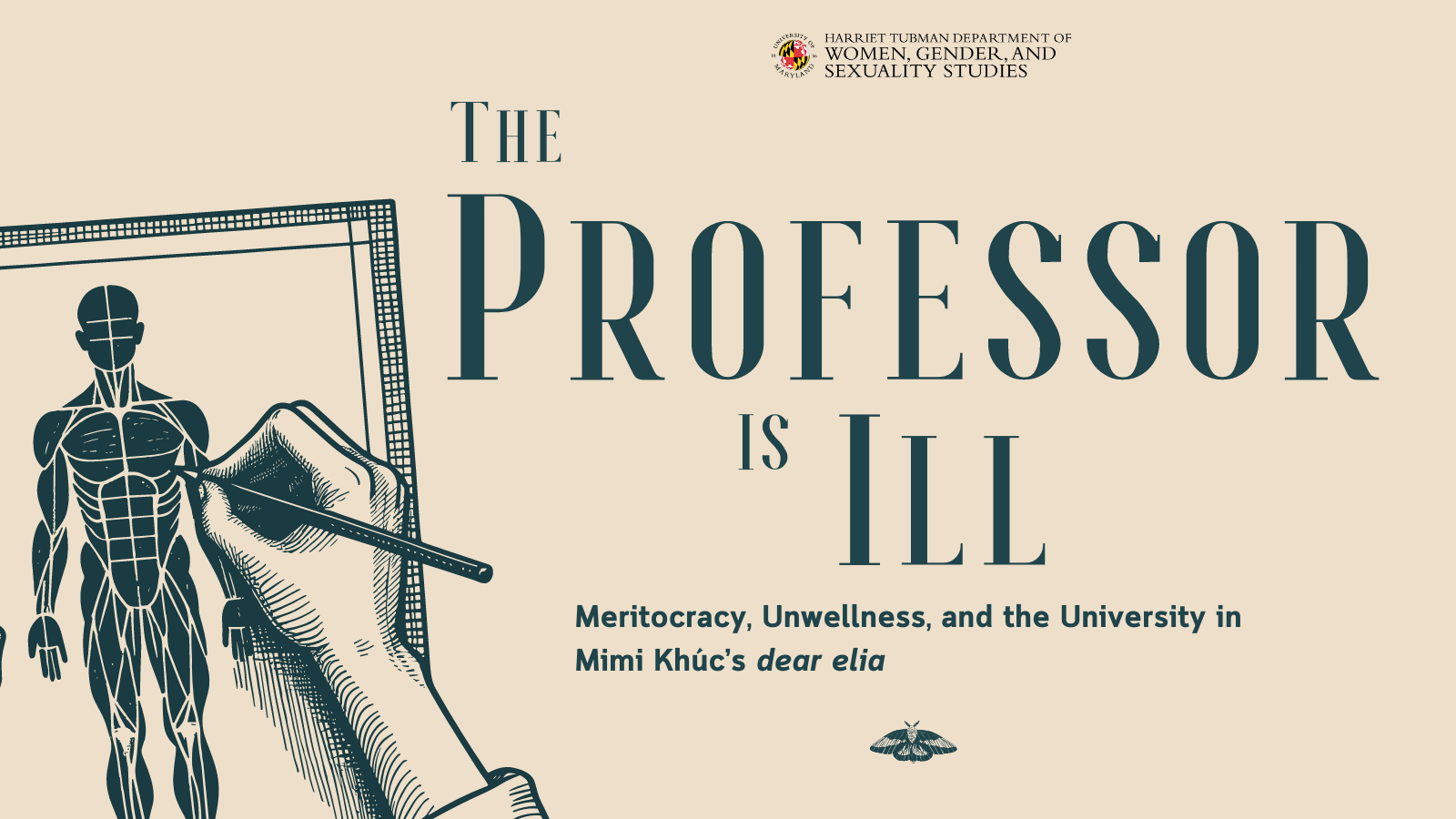Disability Studies Speaker Series 2024

Disability Studies Speaker Series 2024
The Harriet Tubman Department of Women, Gender, and Sexuality Studies is excited to announce the 2024 Disability Studies Speaker Series. This year's speaker series will feature virtual and hybrid talks with three speakers. For more information on individual talks, check out the related events below.
October 21, 3 PM EST, Virtual - Menace to the Future with Jess Whatcott
In Menace to the Future, Jess Whatcott traces the link between US disability institutions and early twentieth-century eugenicist ideology, demonstrating how the legacy of those ideas continues to shape incarceration and detention today. Whatcott focuses on California, examining records from state institutions and reform organizations, newspapers, and state hospital museum exhibits. They reveal that state confinement, coercive treatment, care neglect, and forced sterilization were done out of the belief that the perceived unfitness of disabled, mad, and neurodivergent people was hereditary and thus posed a biological threat—a so-called menace to the future. Whatcott uncovers a history of disabled resistance to these institutions that predates disability rights movements, builds a genealogy of resistance, and tells a history of eugenics from below. Theorizing how what they call “carceral eugenics” informed state treatment of disabled, mad, and neurodivergent people a century ago, Whatcott shows not only how that same logic still exists in secure treatment facilities, state prisons, and immigration detention centers, but also why it must continue to be resisted.
Jess Whatcott (they/them) is a teacher, writer, and abolitionist organizer located in the borderlands of San Diego, California. Dr. Whatcott is an assistant professor in women’s, gender, and sexuality studies at San Diego State University, where they are also affiliated with LGBTQ+ Studies and the Center for Comics Studies.
October 28, 3 PM EST, Virtual - A People's Guide to Abolition and Disability Justice with Katie Tastrom
Disability justice and prison abolition are two increasingly popular theories that overlap but whose intersection has rarely been explored in depth.
A People’s Guide to Abolition and Disability Justice explains the history and theories behind abolition and disability justice in a way that is easy to understand for those new to these concepts yet also gives insights that will be useful to seasoned activists. The book uses extensive research and professional and lived experience to illuminate the way the State uses disability and its power to disable to incarcerate multiply marginalized disabled people, especially those who are queer, trans, Black, or Indigenous.
Because disabled people are much more likely than nondisabled people to be locked up in prisons, jails, and other sites of incarceration, abolitionists, and others critical of carceral systems must incorporate a disability justice perspective into our work. A People’s Guide to Abolition and Disability Justice gives personal and policy examples of how and why disabled people are disproportionately caught up in the carceral net, and how we can use this information to work toward prison and police abolition more effectively. This book includes practical tools and strategies that will be useful for anyone who cares about disability justice or abolition and explains why we can’t have one without the other.
Katie Tastrom is a disability justice activist and writer who has worked as a lawyer, social worker, and sex worker. Her work has appeared in the anthologies Burn It Down: Feminist Manifestos for the Revolution and Nourishing Resistance: Stories of Food, Protest, and Mutual Aid, as well as all over the internet including: Truthout, Rewire, and Rooted in Rights. She resides in Syracuse, NY.
October 30, 4 PM EST, Hybrid (3105 and online) - Dear Elia with Mimi Khúc
Join Dr. Mimi Khúc as she shares her work on unwellness and the university from her new book, dear elia: Letters from the Asian American Abyss. Applying her framework of a “pedagogy of unwellness,” Dr. Khúc explores the contours of student and faculty unwellness and locates it within the racialized ableism of meritocracy that undergirds university life (and beyond).
Academic hyperproductivity across university strata is a kind of unrelenting dehumanization that relies on something she name “compulsory wellness”—the pressure to always pretend you are ok and achieve at the highest levels. We in the university live and work in a machine that makes us unwell while not allowing us to be unwell and punishes us for being unwell and asks us to punish others for being unwell so that we can prove we are well. Join this event to explore together how to disinvest in this form of university wellness and begin to build structures of care that we need.
--
Mimi Khúc is a writer, scholar, and teacher of things unwell. She is an adjunct, and her work includes Open in Emergency, the Asian American Tarot, and dear elia: Letters from the Asian American Abyss, a creative-critical book exploring unwellness at the intersections of ableism, model minoritization, and the university.
This talk is part of the WGSS Speaker Series in Fall 2024. This is the third of four installments


